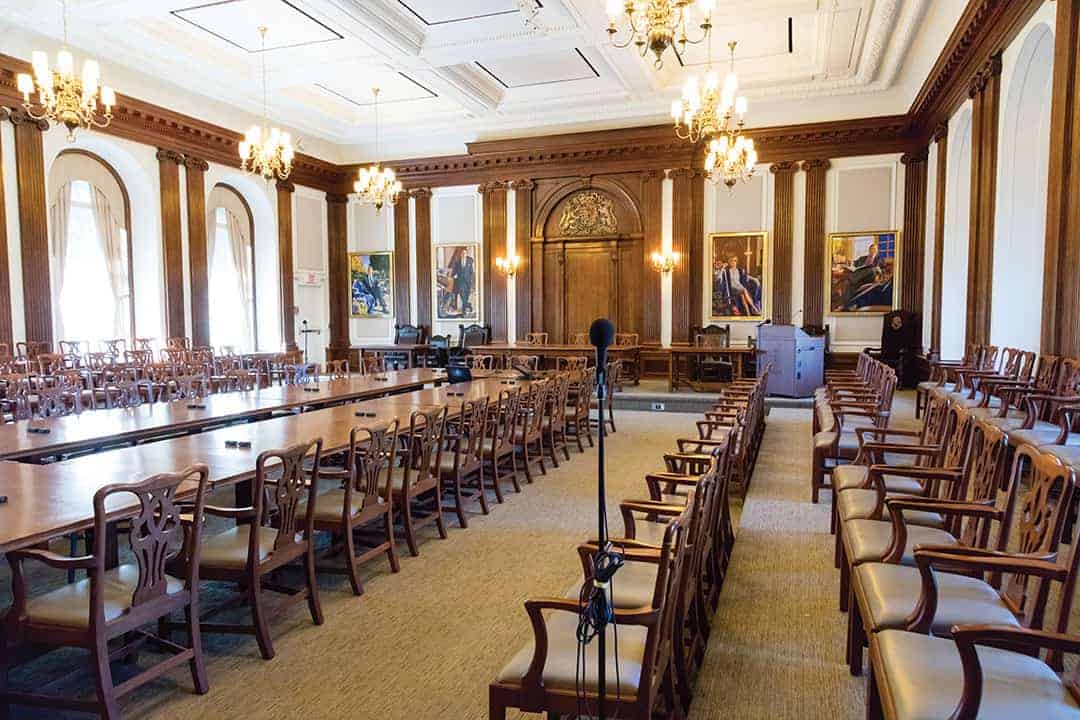On June 1, members of the University Affairs Board (UAB) gathered in Simcoe Hall for their final meeting of the 2021–2022 academic year.
At the meeting, the board approved changes to the University of Toronto Graduate Students’ Union’s (UTGSU) bylaws and approved the University of Toronto Students’ Union’s (UTSU) request for a fee increase.
The Office of Indigenous Initiatives (OII) and the Trademark Licensing Office also presented their annual reports to board members. Additionally, members of the board heard from Jodie Glean-Mitchell — the executive director of Equity, Diversity, and Inclusion (EDI) at U of T — on efforts made in the past year to cultivate EDI in U of T’s pedagogy.
Approvals
The UAB is responsible for overseeing “matters that directly concern the quality of student and campus life,” and it is the governance body in charge of approving changes to U of T’s non-academic policies, including the policies of various student groups. At the June meeting, the UAB passed two resolutions, approving requests from the UTGSU and the UTSU.
First, the board approved amendments to the UTGSU’s bylaws that were passed at the Annual General Meeting (AGM) in December 2021. At this meeting, the UTGSU approved extensive changes to its board structure, as well as comprehensive revisions to its bylaws. These changes established a model that resembles the governance models of other U of T student unions and better aligned the UTGSU with the Canada Not-for-profit Corporations Act (CNCA), as opposed to the Ontario Corporations Act. The CNCA outlines the procedural and structural requirements for not-for-profit corporations.
Next, the UAB approved the UTSU’s fee change request. The union held a referendum in April 2022, in which it asked all full-time undergraduate students at UTSG to “support an increase in the dedicated Accessibility Resources Fund portion of the UTSU fee.”
This fund promotes access to “assistive technologies, grants, and services” for students “with learning disabilities, those who are deaf or hard of hearing, those who are blind or have low vision, and students with mobility limitations, ADHD, or other psychiatric or medical conditions.”
The approved increase adds $0.50 to the UTSU fee starting fall 2022. This fee collection will continue for five years, until spring 2027, when another referendum will be held to determine whether the allocation of this fee is to continue.
Office of Indigenous Initiatives annual report
Board members were presented five annual reports at the meeting.
The board first heard the annual report of the OII, an office established in 2017 to monitor U of T’s progress on the calls to action identified by the university’s Truth and Reconciliation Steering Committee.
During her presentation, the OII’s director, Shannon Simpson, highlighted a number of projects undertaken in the past year, including art installations, curriculum development, and events across all three campuses. She also noted the launch of the Indigenous Research Network, a group that facilitates community-based research and respect for Indigenous cultures, and the Indigenous Creation Studio — a UTM-based makerspace for researchers, students, artists, and the larger surrounding community.
“There’s a lot of amazing things that have happened over the past five years and over this past year,” said Simpson. “But, there’s still a lot of work to be done.”
Annual report on Equity, Diversity, and Inclusion initiatives
Glean-Mitchell presented the annual report on EDI initiatives. The report summarizes the actions taken between January 2021 and December 2021 to foster EDI at U of T. The initiatives were grouped into three categories.
The first category, inclusive leadership and systems change, compiles efforts to collect and analyze equity data to diagnose limitations to EDI at U of T.
The second category, community experiences of belonging, outlines the introduction of community spaces and groups; these include the UTSC Connections and Conversations Affinity Group and the UTM Connections and Conversations Affinity Group. Both groups offer workshops and professional development opportunities for racialized staff.
Further, the second category details initiatives from the Accessibility for Ontarians with Disabilities Act (AODA) Office and the Sexual & Gender Diversity Office (SGDO), such as the accessibility and langauge training the AODA Office provides and the Pride 2021 concert hosted by the SGDO.
The last category, changing institutional culture, highlights community partnerships and various funds in the Investing in Change initiative.
Glean-Mitchell also noted the release of a commitments dashboard to track U of T’s progress on recommendations from the Anti-Black Racism Task Force. The task force was launched in 2020 and released an initial report in March 2021, outlining 56 recommendations to address systemic racism at U of T. The dashboard also tracks U of T’s progress on recommendations from the Anti-Semitism Working Group report released in December 2021.
Other reports
The UAB also received an annual report from the Trademark Licensing Office, which manages the production of merchandise bearing U of T branding. According to the report, the office plans to renew U of T’s agreement to the Bangladesh Accord, which expired in 2018, by signing its successor, the International Accord.
The Bangladesh Accord was drafted to ensure the safety of workers in garment factories in Bangladesh following the Rana Plaza factory collapse in 2013 that claimed the lives of 1,133 factory workers.
Along with these presentations, the UAB also reviewed reports on recognized student groups and campus safety. According to these documents, there was an increase in the number of recognized student groups and a decrease in crime across all three campuses. In addition, the UAB received the review of the Policy on Sexual Violence and Sexual Harassment.


